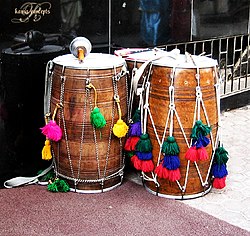This article has multiple issues. Please help improve it or discuss these issues on the talk page. (Learn how and when to remove these template messages)
|
A dohol (Persian: دهل) is a large cylindrical drum with two skinheads. It is generally struck on one side with a wooden stick bowed at the end, and with a large thin stick on the other side, though it is also played with the bare hands. It is the principal accompaniment for the Sorna. A similar instrument, the Dhol, is used in traditional Egyptian, Pakistani and Indian music.
 | |
| Classification | |
|---|---|
| Related instruments | |
In Balochistan it mostly performed by forming a circle by a group of people, dancing and clapping. Do-Chapi almost always includes Sorna and Dohol.[1][2]
In Iran edit
The dohol in Iran is mostly played in wedding ceremonies and other celebrations. The dohol is mostly played with a sorna.
In Afghanistan edit
The dohol in Afghanistan is mostly played on special ceremonies such as wedding ceremonies. The "Surnay or Sorna" is mostly played with it. The Afghan dance Attan is traditionally performed with both the Dohol and Surnay.
-
Dohol drums
-
Baloch people performing a dance at the Zabol University
-
Afghan National Police performing the Attan dance with Dohol and Surnay
See also edit
References edit
- ^ "دوچاپی آیینی ماندگار در سیستان و بلوچستان" (in Persian). Retrieved 22 December 2023.
- ^ "The infectious Baloch dance". Archived from the original on 2022-03-21. Retrieved 2023-12-22.
{{cite web}}: CS1 maint: bot: original URL status unknown (link) - ^ "The Forging of Musical Festivity in Baloch Muscat: From Arabian Sea Empire to Gulf Transurbanism to the Pan-Tropical Imaginary". Retrieved 30 December 2023.
- Mehran Poor Mandan, The Encyclopedia of Iranian Old Music, Tehran, 2000.
External links edit
- Sorna and dohol video on YouTube